- Home
- Hammond Innes
Attack Alarm Page 8
Attack Alarm Read online
Page 8
“Well, we did see as many as thirty odd of our fighters in the air at once the other day.”
I said: “I was assured that every precaution possible was being taken.”
“Oh, you was assured, was you, mate? You’ve got a bloody nerve, you ’ave. Who started all this?—you just tell me that. An’ you say you been assured it’s all O.K. Well, I’m scared, mate, I don’t mind telling you. Give me a baynet. Cold steel, that’s wot I like. But this waiting to be bombed! It ain’t war—not by rights it ain’t. I oughta have bin in the infantry. I would’ve too, only——”
“Only the Buffs was full up,” said Chetwood. “If you don’t like ack-ack, apply for a transfer—otherwise shut up.”
“You don’t speak to me like that, mate,” Micky grumbled on to himself, but he didn’t do anything about it.
“Well, thank God we have some defence here,” said Helson, “even if it is only the much-despised three-inch. I shouldn’t like to have to sit around at a place like Mitchet with nothing but Lewis guns, waiting for an attack.”
The conversation became general again, but every now and then a question was hurled at me. And always it was the same question put in a different way—hadn’t the pilot told me anything else? I felt helpless. There was nothing I could say that would satisfy their need of more information about what might be expected the next day. God knows, I was anxious enough about it myself. But, perhaps because my mind was occupied with troubles of my own that centred around something that I felt was so much vaster than a raid on the aerodrome, it did not seem so very important.
I was saved at last from further questions by the air sentry, who opened the door to say that there was a Waaf outside asking for me. I went out to find Marion standing by the pit. It did me good to see her smile as I came up. “I’m sorry,” she said. “I hear you’ve got into trouble over that wire.” Her grey eyes met mine and there seemed a bond of sympathy in the glance.
“It’s I who should be sorry,” I said. “I’m afraid I’ve got you into trouble. A pity it was all for nothing.”
“Oh, but it wasn’t. You see, when the postmistress had read through the wire, she gave me one of those searching looks and asked me the rank of the sender. I had to hedge then. I knew she’d smelt a rat, and though she said she’d send it off, I had my doubts. Then as I was wandering down the street, I met a pilot officer I know. He gave me a lift back to the ’drome. He was just going up to Town, so I asked him to ’phone the message through to your friend. I don’t think he’d let me down.”
“That’s marvellous,” I said. I did not tell her I had got John Nightingale to do the same. It was all to the good. If Bill got both messages he would realise the urgency.
“Do you know anything more?” she asked.
I told her “No.” But I hesitated. There might be something in it. “Is Elaine a particular friend of yours?” I asked.
“I haven’t been here long enough to have acquired any particular friends. I don’t make friends as easily as that.” She smiled. “But she’s fun and we have quite a lot in common. Why?”
“She was dining with Vayle at a sort of country club known as the Spinning Wheel last night.”
She nodded. “I know the place.”
“I wondered, if she were a particular friend of Vayle’s, perhaps you could find out something from her.”
“Yes, but what?”
I shrugged my shoulders. What did I want her to find out?” I don’t know. Anything you can that might help. Oh, yes, one thing—whether Vayle is going to be here to-morrow or not.”
“I’ll do what I can.” She glanced at her watch. “I must be running along. I have my chores to do.”
“Fatigues?” I asked.
“Yes. But it’s not much really—just ironing.”
“I’m sorry. It’s wretched to be landed for a thing like that by doing something for someone else.”
“Don’t be silly.” She laid her hand on my arm. “It was rather fun. Anyway, I ought to have been more careful.” She hesitated, and there was one of those awkward pauses. I thought she was going. But instead she suddenly said: “You know, if there really is something in your idea, then I don’t think your friend will be able to find out much for you. An important agent has his tracks covered up much too well.”
“Yes, but what else do you suggest?”
“I don’t think you’ll discover much outside this aerodrome. If there is anything, it’s here.”
I pondered this for a moment. But though I started to try and reason it out, I knew instinctively that she was right. If this were one of the ’dromes to be attacked then the whole plan was here to be unravelled on the spot. And suddenly I had an idea. It was not a brilliant one. But it did constitute some sort of action—and it was action I needed. “Can you find out whether Vayle is going to be in this evening?” I asked. And then I stopped. “No. That’s asking too much. You’re involved enough as it is.”
“Nonsense,” she said. “I’m as interested as you are. But what did you think of doing?”
“I understand he lives over the Educational Institute. That’s right, isn’t it?” And when she nodded, I said: “I was thinking I might have a look through his rooms. I mean, it seems the only thing to do. Probably I shouldn’t find anything, but——” My voice trailed off. It seemed such a hopeless thing to do.
“That’s rather dangerous, isn’t it?”
I was pleased at her concern. “Can you suggest anything else?” I asked. “I’ve got to do something positive. I can’t just sit around waiting for something to turn up. It is a chance. I can’t think of anything else.”
“He obviously wouldn’t leave anything incriminating about.”
“No, but there might just possibly be some points for someone who was looking for them.”
“I shudder to think what would happen if you were caught. You’d be charged with stealing, you know.”
I shrugged my shoulders. “What’s it matter?” I said. “To-morrow a bomb may land on this pit and blow me into little bits. Anyway, I hear there’s a waiting list for the Glasshouse.” I was very conscious of the fact that she hadn’t vetoed it as useless. “If you can find out his movements, I think I’ll have a shot at it,” I said.
She seemed on the point of raising some objection. But all she said was: “I’ll do my best. I’m on duty at eight. If I find that he’s going to be out, I’ll stroll up as far as your pit before going into Ops. If I can’t find out anything, or if I find he may be in, I won’t come. It might be thought rather odd if we were seen talking to each other twice in one day.”
“Good idea,” I said. “I’ll be watching for you. It’s sweet of you to do all this.”
She smiled. “Good luck!” she said. “And don’t forget to let me know what happens.”
I stayed a moment watching her slim figure walking down the roadway. She didn’t look back, and I turned and went into the hut with a queer feeling of having burned my boats. I found myself hoping that she wouldn’t discover that Vayle was going to be out that night. Otherwise I was committed to an escapade that might seriously affect my life for the next few months.
The hut was seething with an argument about food. John Langdon had come back from the orderly room with the news that as from lunch that day the three-inch teams would feed on their sites, the food being brought out in hay-boxes by the troop van. Most people seemed against the new arrangement. Partly it was the usual conservatism. Partly it was the prospect of being confined even more than before to the site. This was my own objection. But then my case was peculiar. It meant that I could only get away from the site to wash. Normally, however, I should have welcomed it, as I hated the queuing for food and the hurried, crowded eating that was inevitable in the over-full mess.
“Soon well be confined entirely to the site like Hanson here,” said Chetwood.
“With a well-meaning old dear coming round with a canteen twice a week to dispense tea.”
“But do you mean to say,
John, that we’ve just got to hang around here until the van comes along with the food?” said Kan. “It’s absolutely fantastic. It’s bad enough in the mess. But getting the stuff half cold will make it quite impossible. I shall just go down to the mess as before. I mean, it’s frightful being stuck up here for meals as well.”
“No, you can’t do that,” said Langdon. “It’s a good idea really. It means we can all get food without leaving the site only half manned.”
So the argument went back and forth. It was so delightfully mundane, by comparison with my own thoughts, that I enjoyed it. And when the lunch actually did arrive, every one found it much better than they expected. It came with a table and benches and masses of plates. What is more, it was hot.
Pleasantly full, I lay back on my bed to smoke a cigarette. For the moment I felt at peace with the world—tired and relaxed. God! how quickly that fleeting mood was shattered.
I had barely finished my cigarette when Mason came in. He fluttered some papers in his hands. “New aerodrome passes for old,” he said.
They were the new passes issued to make it more difficult for unauthorised persons to gain entrance to the ’drome. Our old ones had to be handed in in exchange. I took my Army pay-book out of my battle dress, which was lying on top of my suitcase beside my bed. From a pocket at the back I drew out my old pass. As I did so another folded slip of paper fell to the ground. I bent down from the bed and picked it up. Curious to know what it was as I could not remember having put another paper there, I opened it.
When I saw what it was a cold shock of horror ran through me. Had it been my death warrant I could not have felt more frightened. I stared at it, stupefied. It was strange. That single sheet of paper with the two clear-cut creases where it had been folded was so completely damning.
CHAPTER FIVE
SUSPECT
“HALLO, what have you found?” A quick movement of my hand turned the paper face downwards. The action was automatic, secretive. I glanced up. I felt that my very movement betrayed me. It was furtive. Chetwood was standing over me. “Just a letter,” I said hurriedly.
As I said it, I knew even my voice betrayed me. It was too hurried.
“Funny sort of letter,” he said.
I opened my mouth to make some explanation about an old diagram. Then I shut it. Thank God I had that much sense. He could think what he liked. I gazed up at him, hot and tense. He seemed on the point of making some further remark. But Mason came up and asked for his old pass, and he forgot about it.
I handed in my old pass and was given my new one in exchange. I folded it and slipped it into the pocket of my Army pay-book. And all the time the crumpled paper in my hand seemed to burn my flesh. I felt every eye in the room must be watching me. Yet when I stole a quick glance round every one seemed busy examining and putting away the new passes, and Chetwood was hanging up his battle dress.
I got up as nonchalantly as I could and went out to the lavatory at the back of the hut. I was conscious of each movement of my tensed limbs. I felt they must be watching me. In the seclusion of the lavatory I smoothed out that wretched piece of paper and examined it once again with the aid of a match.
There was the landing ground with the criss-cross of the runways—the hangars, mess, quarters, gun sites, everything was marked. It was neatly drawn in common blue ink. Everything of interest to the enemy was indicated in fine hand print, even to the field telephone wiring and ammunition stores at gun sites and at the armoury. The information was precise and the drawing accurate. In view of the fact that such a document had recently been found in an agent’s hands, it was as incriminating a piece of evidence as any one could wish to be caught in possession of.
I felt sick at the thought of what I should have had to face if I had not discovered it in time. And it was with a sense of immense relief that I watched the flames consume it as I set a match to it.
But the sense of relief did not last long, and I sat there in a state of numbed fear at the thought of what it meant. For it meant, of course, that I was a marked man.
I had no longer any doubts about the reliability of the pilot’s information. I knew that I was right about Vayle. This was something big. There could be no other possible explanation of such elaborate steps being taken to dispose of a mere gunner. And I was horribly aware of the danger of my own position.
Press men, I know, are supposed to be tough. There is a firm belief that they are always adventurers capable of getting out of any situation. That is true of some, especially the free-lance foreign correspondents. But nothing could be further from the truth in the case of most newspaper men. The majority of them have a job that involves mainly office work. That job is to collate facts and reproduce them in the form of readable matter. I was one of the majority. True, I had been in our Berlin office and had seen quite a bit of the world for my age. But I had been no more than a spectator. Because a journalist writes about exciting things it does not mean he leads an exciting life. I suppose my life had been more interesting than it would have been in, say, my father’s insurance business. Nevertheless, though I had led the free and easy life of Central London with a flat of my own and no responsibilities, it had really been quiet and respectable. Certainly I had never been in any serious scrapes.
I was, therefore, no more equipped by my civilian life to get out of the fix I was in than the next man. And I certainly wasn’t any less scared. I sat there literally petrified. Behind the closed door of that lavatory I had the temporary illusion of security. Outside, I faced the uncertainties of a situation that was rapidly getting beyond me.
I tried to steady myself. Somehow I had got to go back into that hut as though nothing had happened. I settled down to consider how the document had got into my Army pay-book. The more I thought about it, the more I realised that it must have been placed there after my interview with Ogilvie the previous night. Obviously no such definite action would have been taken until it was known first that Ogilvie was not willing to have me transferred, and secondly, that I was continuing to make a nuisance of myself. My Army pay-book had been in the breast pocket of my battle top all the time. The paper could have been placed in it whilst I was asleep. But that meant there was one of Vayle’s agents actually in the detachment, and at the same time it would have been risky, to say the least of it, in a crowded hut. No, the most obvious time was during the morning’s short alarm. I had taken post in my shirt sleeves owing to the heat. I had left my battle blouse on my bed, and the hut had been empty.
It was then that I realised I had discovered something. The hut had not been completely empty. The whole detachment had been on the gun, but there were still the two workmen. And I remembered seeing the younger one pedal off on his bicycle. The older man had been alone in the hut. As soon as I remembered this I had no doubt as to how the paper had been planted on me. For no apparent reason the workmen had chosen that particular morning to turn up to do a job that we had never expected to get done at all. Now I knew why they had come. But what amazed me more than anything was that they were taking all this trouble over me. I could not believe that I was really dangerous to them. It could only mean one thing—that they felt themselves vulnerable if the attention of the authorities was persistently drawn to this idea of a plan. And since they were evidently leaving nothing to chance, it meant that the scheme, whatever it was, was vitally important. It also meant that at any moment I should be faced with further developments in the plan to put me out of the way. Somehow they had to arrange for the document they had planted on me to be found. It was a nasty thought.
But at least I had the consolation of knowing that I really was on to something. It strengthened my resolve to go through with it—to break into Vayle’s rooms, to badger the authorities, to do anything to expose the plan.
I opened the door and went back into the hut. Hardly any one looked up as I came in. Most of them were lying on their beds, smoking, or already asleep. I was glad. It gave me a chance to recover my confidence.
&
nbsp; Kan, who was sitting at the table, smoking, suggested a game of chess. Anything to take my mind off my position. We settled down amongst a litter of unwashed crockery.
I had just driven his king into a corner and checked him with a knight, when the door opened.
“Party, party, ’shun!”
It was Ogilvie with Wing-Commander Winton. They were accompanied by a man who looked like a workman.
“Where’s Sergeant Langdon?” Ogilvie asked. His voice sounded gruff and tense. I had a sudden premonition of trouble.
“He’s in his room, sir,” said Bombardier Hood. “I’ll fetch him.”
The sergeant had a separate room at the end of the hut. A moment later John Langdon appeared, looking very boyish with his hair all tousled and his eyes still full of sleep.
“Identification parade, Sergeant Langdon,” snapped Ogilvie. “I want every one lined up down the centre of the hut.”
“Very good, sir.” He turned about. “Bombardier Hood, right marker!” Hood took up his place at the far end of the room. “On Bombardier Hood in one rank fall in!”
Automatically we jostled into a line and stood at ease. “Detachment, detachment, ’shun!”
“Thank you, Sergeant. Now”—Ogilvie turned to the workman—“see if you can spot your man.” And as the fellow walked slowly down the rank, he said to Langdon, “A man in the uniform of a gunner has been reported asking rather obviously leading questions of the post-office men laying the operations lines.”
I stood very stiff, my eyes fixed on the wall opposite and my muscles tensed. I knew what was going to happen. I sensed rather than saw the man pause opposite me. Then his slow voice said, “I think this is the man.”
“Who is it? Hanson? Ah!” Out of the corner of my eyes I saw Ogilvie glance significantly at the C.O. “Well, Hanson, what have you got to say?”
My knee joints felt weak. The blood hammered in my head. “I think there’s some mistake, sir,” I heard myself saying. “I have never seen this man before, and I have never spoken to any of the men laying the lines.”

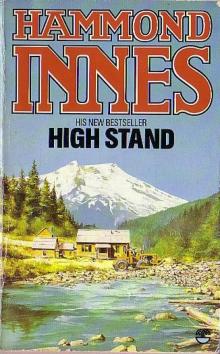 High Stand
High Stand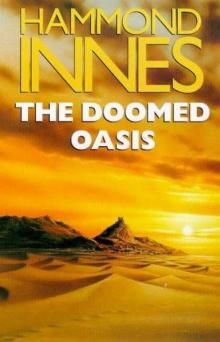 The Doomed Oasis
The Doomed Oasis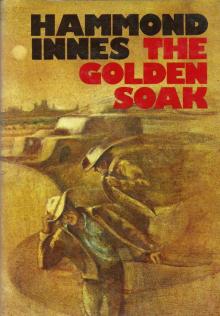 Golden Soak
Golden Soak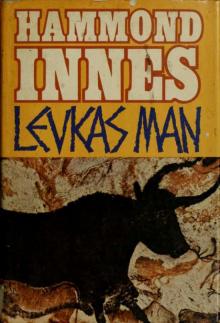 Levkas Man (Mystery)
Levkas Man (Mystery)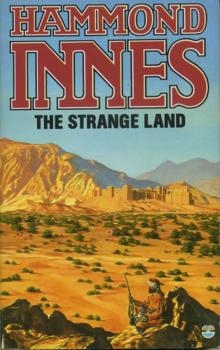 The Strange Land
The Strange Land Dead and Alive
Dead and Alive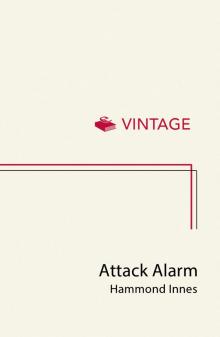 Attack Alarm
Attack Alarm The Strode Venturer
The Strode Venturer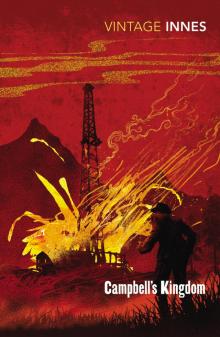 Campbell's Kingdom
Campbell's Kingdom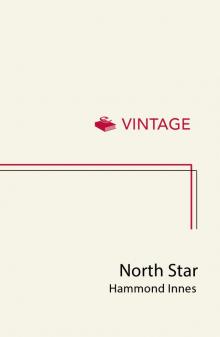 North Star
North Star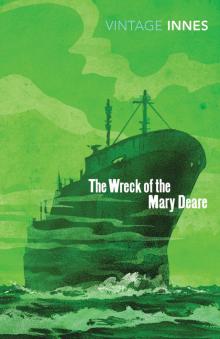 The Wreck of the Mary Deare
The Wreck of the Mary Deare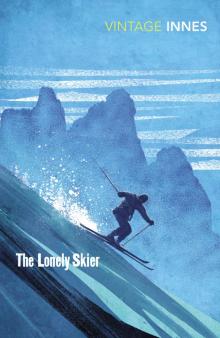 The Lonely Skier
The Lonely Skier The Black Tide
The Black Tide The Trojan Horse
The Trojan Horse Medusa
Medusa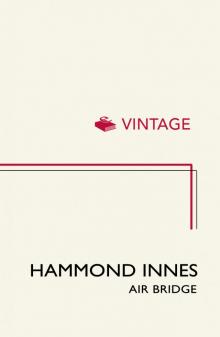 Air Bridge
Air Bridge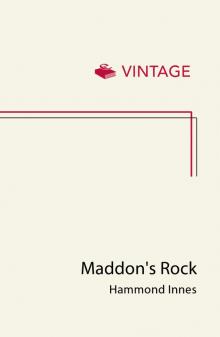 Maddon's Rock
Maddon's Rock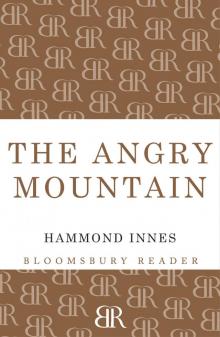 The Angry Mountain
The Angry Mountain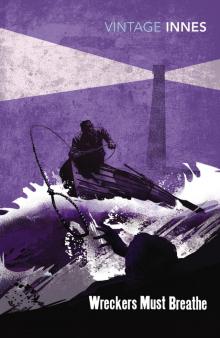 Wreckers Must Breathe
Wreckers Must Breathe Solomons Seal
Solomons Seal The White South
The White South